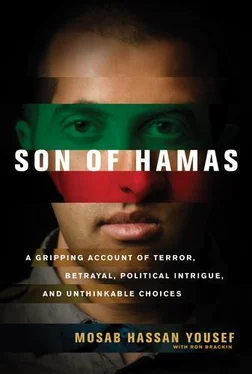“You do too much, Sabeela,” my mother told my oldest sister. “You need to stop and rest.”
But Sabeela just smiled and continued working.
My brother Sohayb and I learned very early how to build a fire and use the oven. We did our share of cooking and washing dishes, and we all looked after Oways, the baby.
Our favorite game was called Stars. My mother wrote our names on a sheet of paper, and every night before bedtime, we gathered in a circle so she could award us “stars” based on what we had done that day. At the end of the month, the one who had the most stars was the winner; it was usually Sabeela. Of course, we had no money for actual prizes, but it didn’t matter. Stars was more about earning our mother’s appreciation and honor than anything else, and we always waited eagerly for our little moments of glory.
The Ali Mosque was just half a mile away from our house, and I felt very proud to be able to walk there by myself. I desperately wanted to be like my father, just as he had wanted to be like his father.
Across the street from Ali Mosque loomed one of the largest cemeteries I had ever seen. Serving Ramallah, Al-Bireh, and the refugee camps, the cemetery was five times as big as our entire neighborhood and was surrounded by a two-foot-high wall. Five times a day, when the adhan called us to prayer, I walked to and from the mosque past thousands of graves. For a boy my age, the place was unbelievably creepy, especially at night when it was totally dark. I couldn’t help imagining the roots of the big trees feeding on the buried bodies.
Once when the imam called us to noon prayer, I purified myself, put on some cologne, dressed in nice clothes like my father wore, and set off for the mosque. It was a beautiful day. As I neared the mosque, I noticed that more cars than usual were parked outside, and a group of people were standing near the entrance. I removed my shoes like I always did and went in. Just inside the door was a dead body, wrapped in white cotton in an open box. I had never seen a corpse before, and even though I knew I shouldn’t stare, I couldn’t take my eyes off him. He was wrapped in a sheet, with only his face exposed. I watched his chest closely, half expecting him to start breathing again.
The imam called us to line up for prayer, and I went to the front with everyone else, though I kept glancing back at the body in the box. When we finished our recitations, the imam called for the body to be brought to the front to receive prayer. Eight men lifted the coffin to their shoulders, and one man shouted, “La ilaha illallah! [There is no God but Allah!]” As if on cue, everyone else began shouting as well: “La ilaha illallah! La ilaha illallah!”
I put on my shoes as quickly as I could and followed the crowd as it moved into the cemetery. Because I was so short, I had to run between the legs of the older guys just to keep up. I had never actually been inside the cemetery, but I reasoned that I would be safe since I was with so many other people.
“Do not step on the graves,” someone shouted. “It is forbidden!”
I carefully made my way through the crowd until we arrived at the edge of a deep, open grave. I peered to the bottom of the eight-foot hole where an old man was standing. I had heard some of the kids in the neighborhood talk about this man, Juma’a. They said he never attended mosque and did not believe in the god of the Qur’an, but he buried everybody, sometimes two or three bodies a day.
Isn’t he afraid of death at all? I wondered.
The men lowered the corpse into Juma’a’s strong arms. Then they handed him a bottle of cologne and some green stuff that smelled fresh and nice. He opened the winding sheet and poured the liquid over the body.
Juma’a turned the body onto its right side, facing Mecca, and built a little box around it with pieces of concrete. As four men with shovels filled in the hole, the imam began to preach. He began like my father.
“This man is gone,” he said as the dirt fell onto the dead man’s face and neck and arms. “He left everything behind—his money, building, sons, daughters, and wife. This is the destiny of each of us.”
He urged us to repent and stop sinning. And then he said something I had never heard from my father: “This man’s soul will soon return to him and two terrible angels named Munkar and Nakir will come out of the sky to examine him. They will grab his body and shake him, asking, ‘Who is your God?’ If he answers incorrectly, they will beat him with a big hammer and send him down into the earth for seventy years. Allah, we ask you to give us the right answers when our time comes!”
I stared down into the open grave, horrified. The body was nearly covered by now, and I wondered how long it would be before the interrogation would begin.
“And if his answers are not satisfactory, the weight of the dirt above him will crush his ribs. Worms will slowly devour his flesh. He will be tormented by a snake with ninety-nine heads and a scorpion the size of a camel’s neck until the resurrection of the dead, when his suffering may earn Allah’s forgiveness.”
I couldn’t believe all this was happening right by my house every time they buried someone. I had never felt good about this cemetery; now I felt even worse. I decided that I needed to memorize the questions, so when the angels interrogated me after I died I would be able to answer correctly.
The imam said that the examination would begin as soon as the last person left the cemetery. I went home, but I could not stop thinking about what he had said. I decided to head back to the cemetery and listen for the torture. I went around the neighborhood, trying to get my friends to come with me, but they all thought I was crazy. I would have to go alone. All the way back to the cemetery, I trembled with fear. I couldn’t control it. Soon I found myself standing in an ocean of graves. I wanted to run, but my curiosity was stronger than my dread. I wanted to hear questions, screaming—anything. But I heard nothing. I moved closer until I touched a headstone. Only silence. An hour later, I was bored and went home.
My mother was busy in the kitchen. I told her that I had gone to the cemetery where the imam said there would be torture.
“And … ?”
“And I went back after the people left the dead man, but nothing happened.”
“Torture can only be heard by animals,” she explained, “not humans.”
For an eight-year-old boy, that explanation made perfect sense.
Every day after that, I watched as more bodies were brought to the cemetery. After a while, I actually began to get used to it and started hanging around just to see who had died. Yesterday, a woman. Today, a man. One day, they brought two people in, and then a couple of hours later, they brought someone else. When no one new came, I walked among the tombs and read about the people already buried there. Dead a hundred years. Dead twenty-five. What was his name? Where was she from? The cemetery became my playground.
Like me, my friends were afraid of the cemetery at first. But we dared each other to go inside the walls at night, and since none of us wanted to be seen as cowards, we all eventually overcame our fears. We even played soccer in the open spaces.
* * *
As our family grew, so did the Muslim Brotherhood. Before long, it had transitioned from an organization of the poor and refugees to include educated young men and women, businessmen, and professionals who gave out of their own pockets to build schools and charities and clinics.
Seeing this growth, many young people in the Islamic movement, particularly those in Gaza, decided that the Brotherhood needed to take a stand against the Israeli occupation. We have taken care of society, they said, and we will continue to do that. But will we accept occupation forever? Doesn’t the Qur’an command us to drive out the Jewish invaders? These young men were unarmed, but they were tough and hard and spoiling for a fight.
Читать дальше












